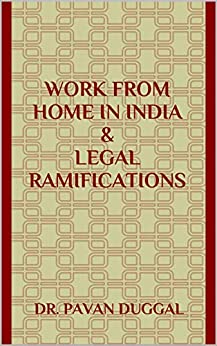COVID-19 & WORK FROM HOME BY DR.PAVAN DUGGAL
Coronavirus and Work From Home Section has been formed to address all issues concerning Work From Home and connected cyber legal, policy and regulatory issues in Coronavirus age.
With Work From Home become a default thrusted and practical reality, there is no running away from Work From Home in the present scenario.
However, most of the entities around the world have been caught unprepared to deal with Work From Home.
With countries having announced and implemented national lockdowns, Work From Home is a paradigm that all stakeholders have had to adopt almost overnight. However, there are immense amount of teething cyber legal, policy and regulatory issues concerning Work From Home.
Coronavirus and Work From Home Section will aim to collate all important and emerging trends pertaining to Work From Home legal jurisprudence. It will also aim to include various links pertaining to different information sources in the public domain, pertaining to the subject at hand and the evolving cyber legal jurisprudence in this regard during Coronavirus times and beyond.
Coronavirus and Work From Home Section has been created by Dr. Pavan Duggal, internationally renowned expert and authority on Cyberlaw.
This webpage begins with the interview with Dr. Pavan Duggal on various aspects pertaining to Work From Home.
Interview with

Dr. Pavan Duggal
Advocate, Supreme Court of India
President, Cyberlaws.Net
Founder-cum-Chancellor, Cyberlaw University
- Could you kindly elaborate the legal and regulatory issues and challenges which companies are facing today in Work From Home scenario?
Ans. There are a number of key regulatory issues and challenges faced by companies working on mission-critical work in a WFH scenario. The most significant issue in today’s context is protection and preservation of cybersecurity of not just corporate data, mission-critical data but also of corporate networks and also of computer systems used at WFH premises. With increasing cybersecurity breaches happening at the global level in the WFH scenario, I believe companies need to be very careful in this regard. Further, companies need to be even more careful that when they are giving access to employees working from home on mission-critical work, the confidentiality of the said data must be appropriately preserved. Corporate data privacy rights of the company in such mission-critical work needs to be duly protected and preserved by the employee.
Further, with increasing employees now being targeted by phishing attacks and other emerging kind of cybercrimes in the post-coronavirus age, companies have to ensure that their workers or employees working from home do not become victims of cybercrimes as these cyber-criminal activities could prejudicial impact not just employees but also corporate data as also, their business and legal interests.
Ensuring confidentiality of data will be another big challenge in this regard. The fact that a number of countries do not have data protection laws nor dedicated laws on cyber security nor specific specialised laws on privacy, further complicates the scenario for all companies. Companies need to quickly realise that when they are allowing work from home, including on mission-critical work, they become intermediaries and network service providers under their national Cyberlaw frameworks. Hence, they are duty-bound to comply with the parameters of due diligence and other compliances under their national Cyberlaw frameworks and rules and regulations made thereunder.
- Are there any key confidential road blocks in the context of client information in the Work From Home paradigm?
Ans. There are key client confidentiality roadblocks in the WFM paradigm. Typically, a client would entrust his personal data and/or confidential data with the company under the given presumption that the said data is going to be safe, secure and shall not be unauthorisedly accessed. However once companies are going in the WFM direction, any kind of breach in client confidentiality issues could open up not just employees but also the companies to potential legal exposure. If companies are not going to be careful in terms of ensuring the cyber security of key client confidential data, then they could potentially be exposed to huge legal liability. Any unauthorised activity by employee in this direction could also potentially expose, both the company and the employee to legal consequences. Clearly, when a company is dealing with dealing, handling or processing of client confidential information and sensitive personal data, it is expected to put in place reasonable security practices and procedures .If such company fails to do so and as a result of which, the client suffers damages, than the company needs to be prepared to pay unlimited damages by way of compensation. Most of the time companies are not even looking at how cyber secure the work from home premises are and whether there could be any chances of potential leakage of key client confidential data from the WFM premises.
WFH scenarios are bringing forward new challenges for a majority of countries. In such a scenario, companies need to put additional care and caution in ensuring that client confidentiality and connected legal and policy issues are appropriately addressed and further employees are sensitized in this regard.
- Given the existing change realities, is there a need to relook at the data secrecy agreement and clauses so as to make them relevant and topical in today’s context?
Ans. I distinctly believe the data secrecy agreements will have to have a distinct relook, to introduce the WFH clause. The clause must mandate that employees working from home will have to still be bound by data secrecy requirements under data secrecy agreements. In addition, companies, who are not having in place, adequate work from home policies, must implement such policies at the earliest. It will be imperative that companies even now must come up with dedicated work from home policies and get appropriate consent from the employees, on a prospective basis, so that at least the companies’ legal interests could be adequately protected.
- What are the specific factors and parameters that you would want companies and clients need to be keep in mind in the context of Work From Home paradigm?
Ans. My advice is that let’s take the existing scenarios of national lockdowns as exceptional emergency situations. Since work from home is required to be done , companies must immediately first, come up with detailed work from home policies, put them up on their websites and intranets, get electronic consent to the same from the regular employees. Only those employees who agree with such policies, should be allowed to work from home. Companies must specifically look at protecting and preserving the cyber security of the premises of working from home. It is a good idea for companies to provide their own devices for WFH so that companies can be in a better position to monitor the same.
Companies should provide appropriate Virtual Private Networks to enable their employees to log on the corporate networks. Companies need to ensure that they have done their due diligence and appropriate compliances. Companies, allowing WFH, need to appreciate that they are intermediaries under their respective national cyberlaws and are mandated to exercise due diligence, while discharging their duties under the law. Further the companies need to be mindful of the potential legal exposure for unlimited damages by way of composition, in case there is neglect on their part in maintaining reasonable security practices and procedures. Companies must also be sensitising their employees about newly emerging kinds of phishing attacks targeted at these employees working from home. Companies need to increase cyber capacity building amongst their WFH employees so that they do not become victims of cyber security breaches or cybercrimes. Constant care and caution has to be the mantra for all companies in this regard.
- You could also further elaborate on any further significant issue in the context of Work From Home.
Ans. Today are exceptional circumstances. As such companies have to be constantly looking at new development on the horizon. The government has not notified specific parameters that companies need to be following in the context of Work From Home. However those could be coming very soon. In case if you have not still run your compliances under the IT law, please review your compliances.
In a majority of countries, people do not have a culture of adopting cyber security as a way of life. As such, companies have to do far more capacity building amongst their employees while working from home in these transient times. The learnings of these times, I believe, could help develop and evolve the jurisprudence concerning Working From Home.
Companies need to be consciously careful, cautious and duly diligent, while allowing work from home because of the various challenges and issues that work from home is beginning to throw up for countries across the world. Hence, companies need to document their due diligence mechanisms, steps, processes, procedures and mechanisms that they have adopted and implemented in order to have a substantial legal foundation of a legal defence, against potential lawsuits tomorrow.
In this constantly evolving situation, we will have to be consciously looking at new developments in this regard. Further, the global international best principles pertaining to work from home must also be appropriately considered by companies and must be appropriately complied with. At the end of the day compliance, compliance and compliance will have to be the only mantra for all stakeholders, to deal with challenges pertaining to work from home.
BOOK ENTITLED “CORONAVIRUS, WORK FROM HOME & LEGALITIES” BY DR. PAVAN DUGGAL

Coronavirus has taken all of us by surprise. No one had expected that this kind of epidemic is soon becoming a pandemic and will affect almost every area of human activity and endeavour. As economic slowdown is facing us in our faces, more and more governments of the world are encouraging private sector employers to allow their employees to work from home. However, working from home brings forward its own distinctive legal policy and regulatory issues.
In this book, Dr. Pavan Duggal has sought to identify some of the important and more significant legalities and also legal, policy and regulatory nuances that all stakeholders need to keep in mind in the coronavirus age, whether it be private institutions, organizations, companies, employers and employees.
Click here to know more about the book “Coronavirus, Work From Home & Legalities“.
BOOK ENTITLED “INDIAN CYBERLAW & WORK FROM HOME” BY DR. PAVAN DUGGAL

Coronavirus has impacted countries across the world and is no exception. With national lockdown being announced and implemented in India, Work From Home has become a practical defacto ground reality.
Most of the companies are forced to now adopt Work From Home. However, Work From Home in India as a concept that has not yet substantially evolve in the past. Hence, Work From Home in India in the Coronavirus age, is likely to bring forward various complicated cyber legal, policy and regulatory issues which stakeholders are beginning to face.
Dr. Pavan Duggal has written this book to sensitize all stakeholders about the legal nuances concerning Work From Home. This Book should be of value to all persons, and specifically private institutions, organizations, employers, employees, lawyers, legal professionals, judges, law enforcement agencies, employees, employers, their business associates and partners academicians, nation states, governments and other stakeholders in the digital ecosystem who are interested in Work From Home paradigm in India.
Click here to know more about the book “Indian Cyberlaw & Work From Home“.
BOOK ENTITLED “WORK FROM HOME IN INDIA & LEGAL RAMIFICATIONS“

The year 2020 has seen an unprecedented public health emergency, which has impacted countries across the world and India is no exception. With national lockdown being announced and implemented in India, Work From Home has become a practical defacto ground reality.
Most of the companies are forced to now adopt Work From Home. However, Work From Home in India as a concept that has not yet substantially evolve in the past. Hence, Work From Home in India in the year 2020, is likely to bring forward various complicated cyber legal, policy and regulatory issues which stakeholders are beginning to face. These cyber legal, policy and regulatory issues and challenges concerning Work From Home need to be keep in mind by all stakeholders while Working From Home. These issues also would need to be merit attention of lawmakers. This book will sensitize all stakeholders about the legal nuances concerning Work From Home.
Click here to know more about the book “WORK FROM HOME IN INDIA & LEGAL RAMIFICATIONS“
BOOK ENTITLED “FAKE NEWS, INFODEMIC & CYBERLAW” BY DR. PAVAN DUGGAL

We are today living in very strange and unprecedented times when there is all kinds of information all around us. While news has been an important tool for humans, the advent of fake news has brought forward completely new paradigm for all of us. We all have been hearing term “fake news”. We have also seen various instances of fake news in our daily lives. However, fake news is not just a superficial phenomenon but attracts various cyber legal nuances and complexities also connected therewith.
This book examine the legal, policy and regulatory pertaining to fake news at the international level. Clearly, fake news has assumed such proportion that it needs to be appropriately regulated. However, there is no unanimity as to how the said regulation of fake news has to take place. This assumes even more significance since there are fundamental differences as to how stakeholders need to define fake news.
Click here to know more about the book “FAKE NEWS, INFODEMIC & CYBERLAW“
In addition to the above, Dr. Pavan Duggal has come up with following detailed Courses on Coronavirus and Cyber Legal Issues.
COURSE ON CORONAVIRUS, WORK FROM HOME & LEGAL ISSUES -DR. PAVAN DUGGAL
Course On Coronavirus, Work From Home & Legal Issues – Presented by Cyberlaw University
In this course, the students will have a broad overview of how increasingly employers are resorting to allowing their employees to Work-From-Home, given the advent of coronavirus and how the Work-From-Home concept has brought in far more new distinctive legal and policy challenges which need to be addressed by all stakeholders, whether it be private institutions, organizations, employers as well as employees.
Both from the perspective of employers and employees, this course provides important insights of what needs to be kept in mind by various stakeholders as they go forward in the direction of trying to understand the nuances of Work-From-Home in today’s times when the coronavirus infection is constantly increasing with each passing day.
What you’ll learn
- In this course, the students will learn about how advent of coronavirus has propelled more and more employers to allow their employees to work from home. The increased reliance upon Work-From-Home as a paradigm in today’s coronavirus age has brought forward various legal, policy and regulatory issues.
- This course would enable all stakeholders, whether it be institutions, organizations, employers or employees to learn about the legal nuances pertaining to Work-From-Home in the coronavirus age and the practical challenges that need to be addressed by relevant stakeholders as they go forward in the direction of successfully conducting Work-From-Home.
Click to know more about Course On Coronavirus, Work From Home & Legal Issues.
COURSE ON CYBERLAW, CYBERCRIME & CYBER SECURITY IN THE CORONAVIRUS AGE
Course on Cyberlaw, Cybercrime & Cyber Security In The Coronavirus Age – Presented by Cyberlaw University
In this course, the students will have broad overview of some of the key important Cyberlaw, Cybercrime & Cybersecurity aspects, issues and challenges that are beginning to crop up on the landscape given the advent and further constant spread of the coronavirus contamination.
With increasing reliance on the internet, every person needs to know about the cyberspace challenges and issues that are beginning to emerge in the coronavirus age. Knowing these cyber legal, cyber criminal and cyber security ramifications emerging in the coronavirus age would enable all stakeholders to be better well prepared to deal with these respective challenges and to avoid becoming victim of cybercrime and cyber security breaches.
- In this course, students will learn about the emerging developments in Cyberlaw, Cybercrime & Cybersecurity that have started happening after the advent of coronavirus. The coming of coronavirus has shaken the entire world. With the increasing people working from home and with the increasing reliance on the internet, there are large number of practical nuances and ramifications that the use of cyberspace is beginning to throw up in the coronavirus age. This course will enable the students to have broad understanding of the cyber legal, cyber criminal and cyber security related trends, ramifications and aspects in the coronavirus age.
Click to know more about Course on Cyberlaw, Cybercrime & Cyber Security In The Coronavirus Age.
LINKS TO IMPORTANT INFORMATION SOURCES
Below are links to some important information sources pertaining to various legal and policy issues concerning Work From Home in the Coronavirus Age:-
- Legal Implications for Telecommuting / Working from Home in Response to the Coronavirus
- Implement ‘Work from Home’ policy for employees: Govt advises companies
- Coronavirus Work-from-Home Response A Boon for Cybercriminal Exploitation
- The Coronavirus at Work: Your Legal Questions Answered
- Coronavirus Legal Issues Around the World, Part 1: Employment Law Issues
- Covid-19 impact: IT firms seek client waivers so staff can work from home
- Key Business and Legal Issues to Consider in Light of COVID-19
- Coronavirus: Best Practices for a Work From Home Policy
- Work-From-Home Checklist During the Coronavirus Pandemic
- Coronavirus and the Workplace: What Employers Need To Know
- Navigating coronavirus: Legal issues employers need to consider
- How To Prepare For The Coronavirus Work From Home Requirement
- The Coronavirus Is Creating a Huge, Stressful Experiment in Working From Home
- Pandemic Coronavirus: Practical and Legal Issues for Employers
- Coronavirus – What employers need to know

